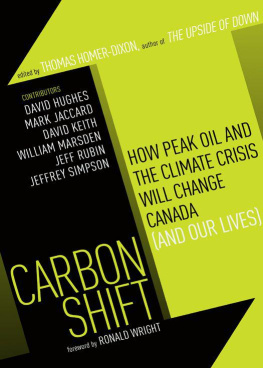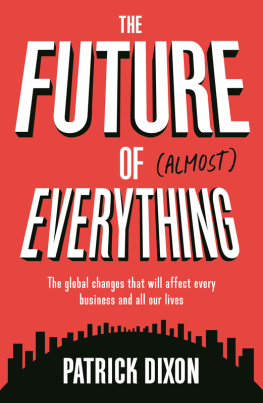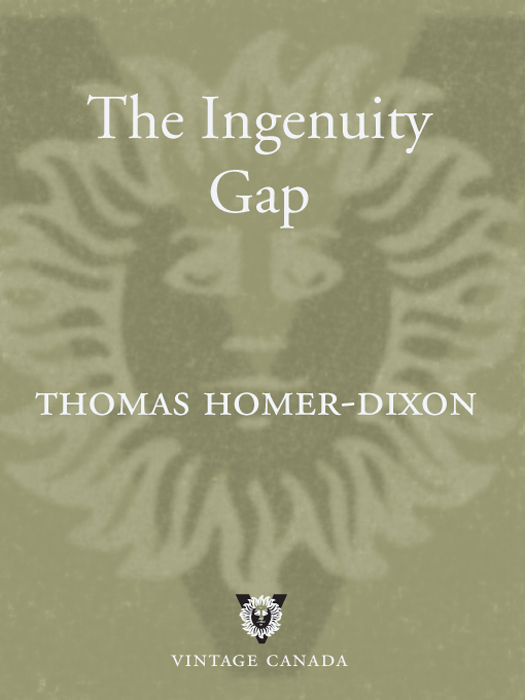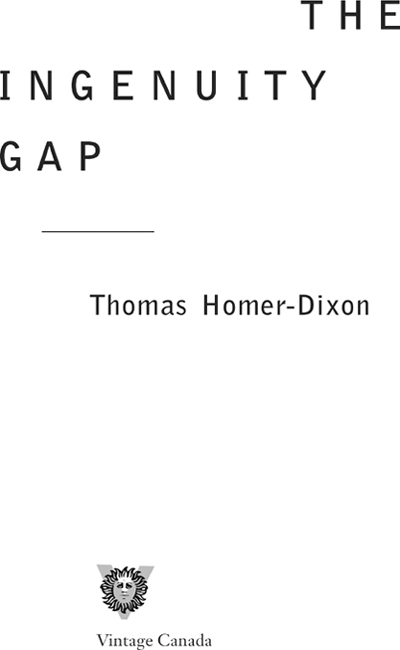To my students
and the future they will make their own
CONTENTS

ONE
3
TWO
7
THREE
11
FOUR
13
PROLOGUE

M OST OF US occasionally suspect that the world weve created is too complex and too fast-paced for us to understand, let alone control. Most of us sometimes guess that even the experts dont really know whats going on, and that as individuals and as a species weve unleashed forces that we cannot manage. The challenges facing our societies range from international financial crises and global climate change to pandemics of tuberculosis and AIDS ; they cross the spectrum of politics, economics, technology, and ecological affairs. They converge, intertwine, and often seem to be largely beyond our kenincomprehensible even to our leaders and specialists.
In this book Ill argue that the complexity, unpredictability, and pace of events in our world, and the severity of global environmental stress, are soaring. If our societies are to manage their affairs and improve their well-being they will need more ingenuitythat is, more ideas for solving their technical and social problems. But societies, whether rich or poor, cant always supply the ingenuity they need at the right times and places. As a result, some face an ingenuity gap: a shortfall between their rapidly rising need for ingenuity and their inadequate supply.
Ingenuity gaps tend to widen the already yawning gulfs of wealth and opportunity within and between our societies. Many societies, groups, and people adapt reasonably well to our swiftly changing world, but others have fallen behind and risk being overwhelmed by converging pressures. In the twenty-first century, the growing disparities between those who adapt well and those who dont will hinder our progress towards a shared sense of human community and erode our new global societys stability and prosperity. The next century is likely, for this reason, to be a time of fragmentation and turmoil, of divisions and rivalry between winners and losers, and of humanitys patent failure to manage its affairs in critical domains.
This picture does not correspond to todays received wisdomat least, not the wisdom espoused by many members of the economic, political, and journalistic elites of Western societies. The opinion and commentary heard from these circles has lately had a distinctly triumphalist tone. A glorious future for all is predicted, thanks to the leadership of the West. The success of the United States, in particular, has revealed the path to universal well-being; all that remains is for other societies to follow its lead.
The West certainly has every reason to be proud of its successes; its capitalism, science, and liberal democracy are marvelous institutions that have made extraordinary contributions to human prosperity and freedom. And certainly Western societies, and again the United States in particular, have seen a remarkable string of economic and political achievements in recent years. But Western triumphalism is partly based on a selective reading of the evidence. Problems and issues that dont fit into this optimistic worldview tend to be downplayed or ignored. Moreover, a significant part of the Wests current success is the result of a confluence of events and processes that its elites neither controlled nor really understand. Western triumphalism is dangerously self-indulgent, and even delusional; it assumes agency where there may be mainly good luck.
This book does not present a fully developed theory, because I have not tried to address all relevant issues or tie off all loose ends. Instead, I have tried to elaborate an intuition or feeling about our future. The ingenuity gap, as I call it, is a way of thinking about the very real chasm that sometimes looms between our ever more difficult problems and our lagging ability to solve them. The ingenuity gap is also a metaphor for the human predicament, a metaphor that can be explored and understood in a multitude of waysanalytically, empirically, emotionally, and spiritually. As a new millennium unfolds before us, it is my hope that this book, in a small way, will give us better tools for understanding who we are and where we are going.

Ingenuity, as I define it here, consists not only of ideas for new technologies like computers or drought-resistant crops but, more fundamentally, of ideas for better institutions and social arrangements, like efficient markets and competent governments. How much and what kinds of ingenuity a society requires depends on a range of factors, including the societys goals and the circumstances within which it must achieve those goalswhether it has a young population or an aging one, an abundance of natural resources or a scarcity of them, an easy climate or a punishing one, whatever the case may be. How much and what kinds of ingenuity a society supplies also depends on many factors, such as the nature of human inventiveness and understanding, the rewards an economy gives to the producers of useful knowledge, and the strength of political opposition to social and institutional reforms.
A good supply of the right kinds of ingenuity is essential, but it isnt, of course, enough by itself. We know that the creation of wealth, for example, depends not only on an adequate supply of useful ideas but also on the availability of other, more conventional factors of production, like capital and labor. Similarly, prosperity, stability, and justice usually depend on the resolution, or at least the containment, of major political struggles over wealth and power. Yet within our economies ingenuity often supplants labor, and growth in the stock of physical plant is usually accompanied by growth in the stock of ingenuity. And in our political systems, we need great ingenuity to set up institutions that successfully manage struggles over wealth and power. Clearly, our economic and political processes are intimately entangled with the production and use of ingenuity.
The past centurys countless incremental changes in our societies around the planet, in our technologies and our interactions with our surrounding natural environments, have accumulated to create a qualitatively new world. Because these changes have accumulated slowly, its often hard for us to recognize how profound and sweeping theyve been. They include far larger and denser human populations; much higher per capita consumption of natural resources; and far better and more widely available technologies for the movement of people, materials, and especially information. In combination, these changes have sharply increased the density, intensity, and pace of our interactions with each other; they have greatly increased the burden we place on our natural environment; and they have helped shift power from national and international institutions to individuals and subgroups, such as political special interests and ethnic factions. As a result, people in all walks of lifefrom our political and business leaders to all of us in our day-to-day livesmust cope with much more complex, urgent, and often unpredictable circumstances. The management of our relationship with this new world requires immense and ever-increasing amounts of social and technical ingenuity. As we strive to maintain or increase our prosperity and improve the quality of our lives, we must make far more sophisticated decisions, and in less time, than ever before.









